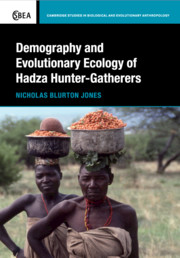Book contents
- Frontmatter
- Contents
- Preface and acknowledgments
- Part I Demography
- Part II Applying the demographic data to interpreting Hadza behavior and biology
- 12 Introduction
- 13 The outcome variables: fertility, child survival, and reproductive success
- 14 Men's and women's reputations as hunters, traders, arrow makers, and diggers
- 15 Marriage
- 16 Another dependent variable: growth as a proxy for fitness
- 17 Inter-birth intervals: a trade-off between fertility and offspring survival?
- 18 Grandmothers as helpers
- 19 Grandmothers and competition between the generations
- 20 Children as helpers
- 21 Husbands and fathers as helpers
- 22 Variation among hunter-gatherers: evolutionary economics of monogamy, male competition, and the sharing ethic
- References
- Index
21 - Husbands and fathers as helpers
from Part II - Applying the demographic data to interpreting Hadza behavior and biology
Published online by Cambridge University Press: 05 January 2016
- Frontmatter
- Contents
- Preface and acknowledgments
- Part I Demography
- Part II Applying the demographic data to interpreting Hadza behavior and biology
- 12 Introduction
- 13 The outcome variables: fertility, child survival, and reproductive success
- 14 Men's and women's reputations as hunters, traders, arrow makers, and diggers
- 15 Marriage
- 16 Another dependent variable: growth as a proxy for fitness
- 17 Inter-birth intervals: a trade-off between fertility and offspring survival?
- 18 Grandmothers as helpers
- 19 Grandmothers and competition between the generations
- 20 Children as helpers
- 21 Husbands and fathers as helpers
- 22 Variation among hunter-gatherers: evolutionary economics of monogamy, male competition, and the sharing ethic
- References
- Index
Summary
I never saw in this region such concerned mothers or such active family fathers as among the Wakindiga …
Obst, 1912, p. 25, p. 16 of translation by Gabrielle KopahlDo these active family fathers and husbands help women and children? By their hunting, Hadza men acquire a great deal of food, sometimes in dramatically large packages (Photograph 21.1). It all gets eaten (Photograph 21.2), usually with astonishing rapidity. Many people benefit from all this food (Photograph 21.3). Do husbands help the growth and survivorship of their children? Is that why men hunt? Is that why men hunt such large game? What about the small game that they take in modest amounts, and sometimes eat on their own out in the bush but sometimes bring back to camp (Woodburn, 1968a, p. 53; McDowell, 1981a; Marlowe, 2010; Wood and Marlowe, 2013, personal observation)? Marlowe has collected detailed observational data on direct childcare by Hadza men, and on men's foraging activity under various family circumstances. In this chapter, I will compare growth and survival of children with and without fathers, with step-fathers, with fathers often or rarely nominated as expert hunters, or with single mothers.
Fathers have attracted much attention in the evolutionary anthropology literature, usually being described as providers for wife and children. The fitness benefit men gain by using the food that they acquire to enhance the number and survival of their offspring has been held to be a major selective factor in the evolution of marriage, families, and other important features of our species. Provisioning has been suggested as functioning to gain access to a mate, to retain the mate, to increase her fertility, to increase the survival of her children. It is difficult, when several possible benefits are listed together, to test any one of them alone. Few tests were attempted until competing ideas came into the field. In their review, Sear and Mace (2008, pp. 5–8) remark “fathers frequently make no difference to child survival … Even where fathers are important for child survival, it is not clear that the benefits they bring to children are the traditionally assumed benefits of provisioning and economic support … indirect evidence that the importance of fathers lies at least partly in protecting children from other males comes from studies of the impact of the mother's divorce and remarriage.”
- Type
- Chapter
- Information
- Demography and Evolutionary Ecology of Hadza Hunter-Gatherers , pp. 416 - 436Publisher: Cambridge University PressPrint publication year: 2016



